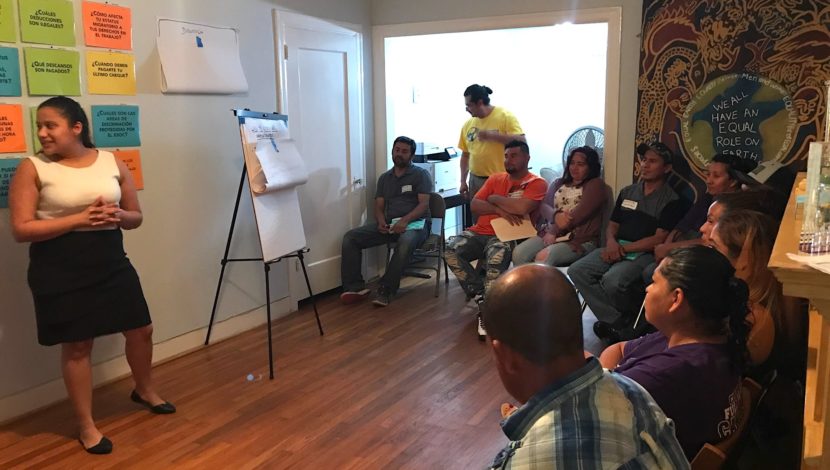The Unitarian Universalist Service Committee advances human rights through grassroots collaborations.
Protecting the Labor Rights of Reconstruction Workers After Hurricane Harvey

By Syma Mirza on November 21, 2018
Fe y Justicia Worker Center’s recently reopened worker empowerment clinic helps vulnerable, low-income immigrant laborers combat wage theft and other labor abuse encountered while rebuilding Houston.
More than a year after Hurricane Harvey devastated parts of the Gulf Coast of Texas, UUSC continues to support several key partners in Houston performing the long, hard work of recovery and rebuilding.
One of these organizations, Fe y Justicia (“Faith and Justice”) Worker Center, has been organizing occupational safety and health trainings for reconstruction workers, the bulk of which are low-income immigrants it terms “second responders.” Due to their personal status as well as the dangerous nature of construction work, these workers are particularly vulnerable to exploitation and prone to injury or illness from, for example, mold or other contaminants. Earlier this year, with UUSC support, Fe y Justicia launched its newly revitalized worker empowerment clinic, an innovative effort that has met considerable success in recovering wages and addressing other labor violations that Harvey reconstruction workers have faced since the storm.
Through its work in the area for over a decade, Fe y Justicia has found that workers in Houston routinely experience wage theft, unsafe workplaces resulting in injury and sometimes death, threats, and violence. A post-Harvey survey conducted by the organization revealed that more than a quarter of workers had experienced wage theft; further, virtually no one surveyed knew where to report this or other safety and health violations. Even a basic case of wage theft can affect workers and their families, as it can result in eviction, food insecurity, or loss of one’s vehicle, making it even harder to earn a living.
Wage theft is the most prevalent labor abuse faced by reconstruction workers. The clinic assists with these cases, as well as theft of services, discrimination, sexual harassment and assault in the workplace, work-related injuries and illnesses, and labor trafficking. From February through October 2018, Fe y Justicia Worker Center documented 384 claims totaling $945,256 in stolen wages. Nearly a quarter of these claims related to Harvey recovery work and occurred in connection with cleanup, mucking, and rebuilding projects after the hurricane.
Case Profile
- Jorge worked as a detailer for an auto dealership services company. He worked 70-hour work weeks but was paid a flat weekly rate. After several months on the job, Jorge injured his arm while cleaning a car. His employer refused time off and cut his pay after Jorge complained about his injury.
- While assisting Jorge with a workers’ compensation claim, Fe y Justicia’s worker empowerment clinic discovered that he had been misclassified as a salaried employee. Following several months of negotiation, Jorge recovered $3,000 in unpaid overtime wages.
- With clinic support, Jorge took his case to the Department of Labor’s Wage and Hour Division to investigate deductions from his and others’ timesheets. Investigation of this possibly company-wide practice is pending.
The clinic employs a three-phase client-centered strategy to recover lost wages: 1) understand what constitutes a violation and build the case, 2) try to resolve cases through negotiation while collecting evidence, and 3) take administrative or legal action where necessary. The clinic presently does not have attorneys on staff; instead it supports workers through dedicated teams of two advisors, a local law student and a worker leader, that serve as case managers and advocates. These teams assist workers by providing education and guidance, case management and accompaniment, and referrals to government agencies, non-profit law firms, attorneys. Workers are asked to attend, “know, defend, and exercise your rights” workshops to educate themselves and help further their case.
Case Profile
- Mauricio, a small contractor, performed a painting job at a private home. He paid three other individuals out of his own pocket to help with the work. Upon completion, the homeowner refused to pay Mauricio and used violent, racist threats.
- Fe y Justicia’s worker empowerment clinic tried resolve the case through direct action and mediation, but the homeowner was uncooperative and violent. The clinic thus began working with the District Attorney’s Office and Southside Place Police.
- After weeks of evidence-gathering and support navigating government procedures, the D.A. pressed criminal charges against the homeowner for non-payment of wages. The homeowner was arrested in Houston’s first theft of services prosecution and is currently awaiting trial.
The clinic is sustained through very modest fees, and it requests a five to 20 percent donation from any wages recovered. Eventually, Fe y Justicia hopes to raise enough funds to hire a lawyer on staff that can then help sustain the clinic through attorneys’ fees awarded in favorable judgments it helps obtain. The center views negligent enforcement of worker rights in Texas as a major determinant of social inequality. Thus, Fe y Justicia seeks to build workers’ collective power not only to achieve better working conditions but also to address larger social, political, and economic challenges that workers face.s
*Special thanks to the staff of Fe y Justicia Worker Center for providing case details for this blog.
Read This Next
A Valentine’s Message to Those Transforming Hearts, Minds, and Lives
This Valentine’s, we’re sending gratitude and solidarity to all our tireless grassroots partners who work to build safer, more just, and welcoming communities for all. Read More →
